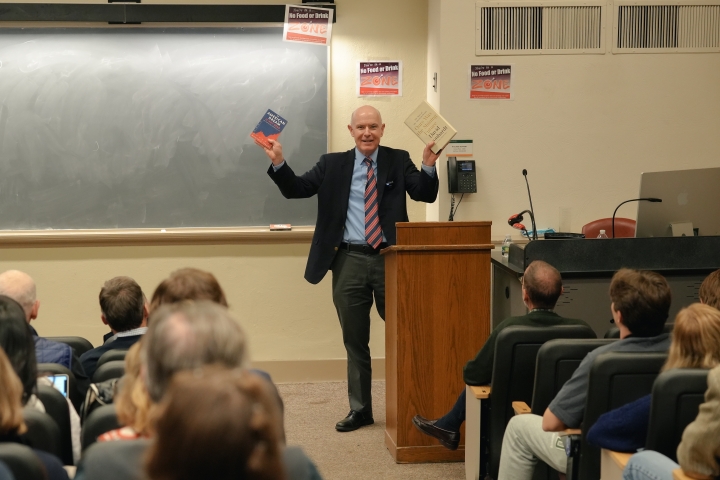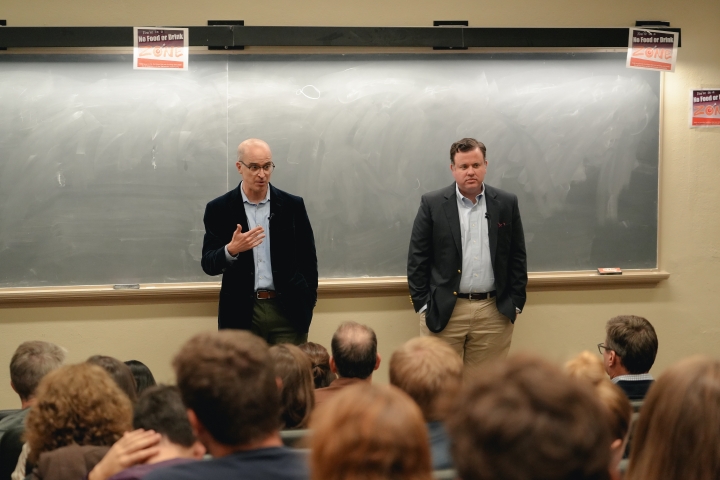The American Dream of an education, home, and thriving future for your children is still alive, but whether it is possible to secure those fundamentals for subsequent generations is one of the great questions facing this country, two experts on the subject said at a Dartmouth debate on Monday.
“If you ask me, are you happy with the state of the country, and are you happy with how things are going? I would say no. If you ask me, do you think the American Dream is alive and well, I would say, yes, I do. And I don’t think those are inconsistent with each other,” economist Michael Strain told an audience of 100 in a classroom in Carpenter Hall as part of a debate sponsored by the Political Economy Project.
For journalist David Leonhardt, the answer to whether the American Dream is alive and well “is mixed, but it’s not particularly positive.”
Strain is the director of economic policy studies and the Arthur F. Burns Scholar in Political Economy at the Washington-based American Enterprise Institute and the author of The American Dream is Not Dead: But Populism Could Kill It. Leonhardt is a Pulitzer Prize-winning journalist at the New York Times and author of Ours Was the Shining Future: The Story of the American Dream.
The wealth gap between the wealth-holders and members of the middle- and working class has expanded so rapidly that while a child born in this country in 1940 had a 92% chance of growing up to outearn their parents, for a child “born in 1980, your chance of outearning your parents is just 50%,” Leonhardt said.
The term “the American Dream” was coined by author James Truslow Adams in 1931 in his history of the United States, The Epic of America, Leonhardt said. The key to what Adams described as a “better, richer, happier life for all our citizens of every rank” was social mobility, Leonhardt said. The hope that you and your children could prosper, live comfortably, and get a decent-paying, steady job that would last for decades has drawn millions of immigrants to the United States.
That optimistic picture has dimmed, particularly for native-born Americans, Leonhardt said. “When you look at the roughly two-thirds of American adults who do not have a college degree, the picture starts to look a lot less pretty,” he said.
While income growth has been “above zero over the last two decades, that’s a pretty low standard to say that income growth has been better than nothing,” Leonhardt said.
The disparities between the top tier of great wealth and the lower tiers have resulted in a divided, frustrated, angry electorate with a low regard for the institutions that were once held up to the world as pinnacles of American exceptionalism: the courts, the press, public and higher education, the American health care system. The life expectancy of Americans is lower than similarly rich nations, and the increase of single-parent families has enormous ramifications for the country’s future, Leonhardt said.
Strain acknowledged the current pessimism of the American people. “Countries have moods, just like people, and America is in a bad mood.” There are always periods of struggle, he said. But, he is “an unapologetic defender of the health of the American Dream. I’m also an unapologetic defender of the view that we can do better. We need to do better. And I think we will do better.”

Strain ticked off the advances in medicine and pharmaceuticals, the decrease in the national rates of poverty and violent crime, and higher wages for the American worker, even when adjusted for inflation. Shorter life expectancy when compared to other rich countries has been a problem, but in 2022, Strain said, it began to rise again.
“Forget about the statistics for a minute. Who of you who were alive in the 1970s would want to go back and live in the 1970s? Who among you who weren’t alive in the 1970s would rather go back and live in the 1970s than live today? I would guess no one. That will be particularly true if you’re a racial minority. It will be particularly true if you’re a woman,” Strain argued.
The United States has the skill, the knowledge and the talent pool to improve economic outcomes, ameliorate living standards, and shape better lives for the younger generations. “And that should give us confidence that we can continue to advance the American Dream,” Strain said.
The generations of immigrants who have come to the U.S. since the Immigration and Nationality Act of 1965, which ended quotas on which immigrant groups were permitted to enter, is an “incredibly positive story about this country,” Leonhardt said. Immigrants from Asia, Africa and other countries outside northern Europe have largely succeeded in climbing the ladder. What is worrying is the stagnant or downward trends for generations of native-born Americans that are “overwhelmingly either Black or white,” Leonhardt added.
There are no magic pills to restore American confidence or rapidly sort out the challenges of income and racial inequalities, both Strain and Leonhardt said. The point is to work to improve them.
“The argument about whether the American Dream is alive and well is fundamentally an argument about what we need to do to live in a better country that produces better lives for so many of our fellow citizens, and that also has the confidence to do things on the world stage that only the United States has shown itself to be able to do,” Leonhardt said.
There’s an irony in that two of the loudest proponents of a declining and anarchic United States happen to be running for the presidency and vice-presidency, Strain said. Former president Donald Trump has reached the highest office that an American politician can reach and has accumulated billions of dollars in wealth.
For his part, U.S. Sen. JD Vance, R-Ohio, “talks about how terrible the possibilities are in this country. His life is evidence that what he is saying is false,” Strain said.
After the debate, economics major Cooper Whalen ’25 said he found the conversation between Strain and Leonhardt very informative and enriching.
“I found it refreshing to see two people with very different opinions having a civilized discourse,” added Sophia Kohmann ’28.

